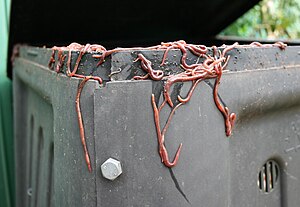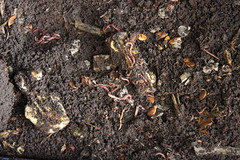 Image via WikipediaYou may think worms are boring. After all, they just lay there and wiggle. They don't do any tricks that you can watch. They don't make cute sounds. But worms are an interesting, beneficial part of our world. They have several uses that make them worthwhile to our existence. You have to look beyond the obvious and appreciate the results sometimes to get the most benefit from an experience. That's where worm farming comes in.
Image via WikipediaYou may think worms are boring. After all, they just lay there and wiggle. They don't do any tricks that you can watch. They don't make cute sounds. But worms are an interesting, beneficial part of our world. They have several uses that make them worthwhile to our existence. You have to look beyond the obvious and appreciate the results sometimes to get the most benefit from an experience. That's where worm farming comes in.Have you ever heard of worm grunting? Not many people have, it's apparently a dying art. It's a way of harvesting worms that's still kept alive in Florida. One small town has a yearly worm festival and gets visitors from all over to partake in their fun. Professional worm grunters entertain guests to this event. The worm grunters use a simple method to create the kind of vibrations that bring the worms to the surface of the ground for gathering. You could practice worm grunting on your worm farm for your little visitors' delight. Many small children get their fun from grossing out adults, so going to a worm farm or festival would be a great adventure trip for them.
Now before you think, "That's it. I don't have to start a worm farm. I'll just gather my worms from the wild woods or people's yards!" You must know that when you take a beneficial part of the environment away from other places, it also takes the benefit of what it does for that area of the earth. That's why re-planting of trees is encouraged, if we take away from the environment we must also return something to the environment or we all eventually suffer the consequences.
Even if you don't find any fun in worms, you could raise them for the benefits you are able to get from them. Songbirds like grub worms. Grub worms are white with a red head, a C shaped body, and are about as big as the end of a thumb. If you have a grub worm farm, you can encourage song birds to visit your home property for your entertainment and bird-watching pleasure. So, while you may not consider raising the worm farm to be fun, you can still get your pleasure knowing you are getting more feathered visitors! Your bird-watching friends can gather at your house and enjoy the fun with you. They'll be thankful for your worm farm, too. (Be aware that grub worms do eat plant roots and leave dead, dry patches of grass. So, just encouraging their existence in your yard is not the best idea. You'd want to contain them in their own areas for the safety of your other plants.)
You may get some fun from cooking with worms from your own worm farm; this way you will know no pesticides or diseases have tainted them or their flavor. You could entertain children at the local library by using some recipes specifically including the worms for ingredients. If the local librarians aren't open to the idea (some people have an irrational fear of worms and some are just plain grossed out about eating them), you could try a demonstration at the nearest zoo. Flour can be made from the worms to use in recipes. Some worms are eaten raw, but most Americans aren't open to the experience.









